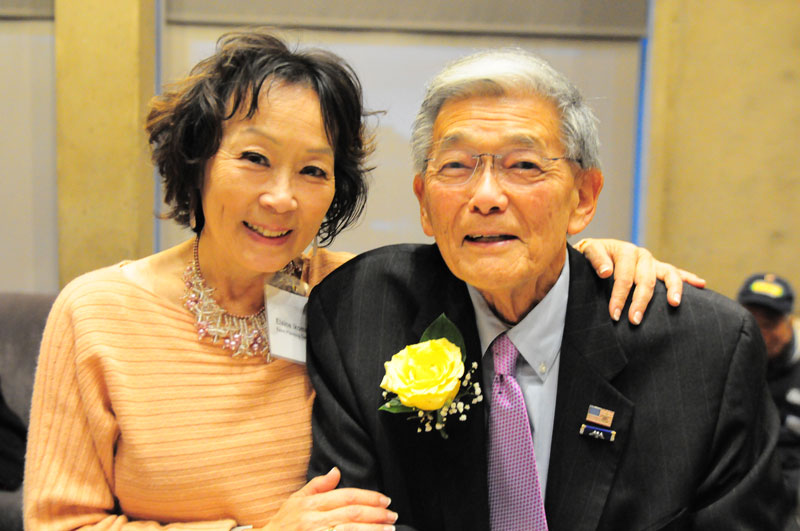
By Elaine Ikoma Ko For The North American Post
Tomio Moriguchi and I had the honor of attending the memorial for Secretary Norman Mineta in Washington, D.C. on June 11. Hundreds of family, friends, staffers, dignitaries and colleagues attended. Over 500 joined the livestream of the memorial honoring the great American statesman. A special recognition reception was also held there at the Embassy of Japan.
It is my suggestion that local readers tune into the livestream of the memorial on “The Mineta Legacy Project” (minetalegacyproject.com). It is worth every minute and serves to remind us of what can be done when differences are put aside and everyone works together, the hallmark of Secretary Mineta’s legacy.
Much has been written about Mineta’s extraordinary accomplishments and service to the American people: military veteran, city councilman, mayor, senator and Cabinet Secretary of two departments serving under both Democratic and Republican presidents; his tireless leadership on redress for 120,000 Japanese Americans sent to concentration camps; his leadership in passing scores of legislation protecting civil rights and liberties and fighting against injustices for all oppressed people.
And so much more.
As memorialized by a colleague, “Norm never held bitterness as he rose to be in the Cabinet to two Presidents by the same government that sent his family to incarceration camps.”
In the program were tributes from Presidents Bush, Clinton, Carter, Obama and Biden, and House Speaker Nancy Pelosi.
While he was alive, my good friends Debra Nakatomi and Dianne Fukami had the foresight to produce a documentary of his life as well as educational curricula for schools (see Mineta Legacy Project).
But for me, the overwhelming theme of Secretary Mineta’s life was not only that he was a public servant extraordinaire, he was simply a gracious person with a generous heart who was deeply loved by all who had the privilege of knowing him.
“He’s the nicest guy I ever met,” former Congressman Marty Russo stated. His wife, Deni, said, “Norm LOVED life. He was a joyful person, the best husband anyone could ask for.”
Most touching were the remembrances by childhood buddy and former Senator Alan Simpson, himself 90 years old. The two met as Boy Scouts, both age 12, when Secretary Mineta was in the camps at a jamboree in 1942. The event was held behind barbed wire at Heart Mountain, Wyoming, where his family was incarcerated. They became best buddies and remained so until Secretary Mineta’s death. In between, both served in Congress beginning in the 1970s, Simpson as a Republican and Mineta as a Democrat.
“Well, my boyhood friend, my chum, has gone on ahead of me,” Simpson opened his remarks. “He was my hero, too,” Norm would say to him. “Well, the knots we tied together back then (as Boy Scouts) have lasted a very long time.”
Simpson stated emphatically that the incarceration was a result of “racism, war hysteria, and failed leadership” and both men worked together to pass the Civil Liberties Act of 1988, authorizing reparations for those incarcerated.
The love and humor they shared over the decades was heartwarming. Whenever they met, they had a ritual of a hard squeeze while crushing their eyeglasses in their coat pockets, tapping and kissing the other’s head, and squeezing each other while their wives stood by watching with knowing smiles of this “curious ritual.”
Every speaker spoke eloquently about a powerful yet modest man. Civil rights activist Karen Narasaki spoke of Secretary Mineta’s enduring partnership on many issues facing Asian, Native Hawaiian and Pacific Island American communities.
Speaker Pelosi, James Blanchard (who served with Secretary Mineta in the Congressional freshman class of 1975), and retired Admiral James Loy also spoke. Family members gave touching remembrances.
As Speaker Pelosi said, “Norm’s favorite word was ‘citizen,’ because he said it was a word that his own government refused to recognize us as.”
Rest in Peace and Power, Secretary Mineta.







